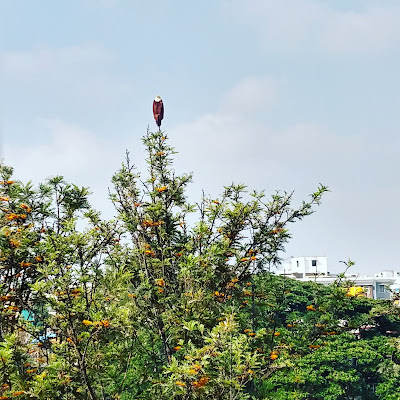A missing vowel, O, creates a new virus in Times of India, Bengaluru, story titled Disinfection: Businessmen in Bengaluru make killing amid scare.
Saturday, June 27, 2020
Friday, June 26, 2020
PM2.5 and Air Pollution in Bengaluru
A report in Bengaluru's Deccan Herald today says that "...Air pollution in Bengaluru dropped by an average 28% during the Covid-19 lockdown".The report cites a study on PM 2.5 levels that decreased during the lockdown as an indicator of air quality improvement.
It is not scientific to conclude that a decrease in one air quality indicator (AQI) results in overall air quality improvement or reduction in air pollution. This is because PM2.5 is just one AQI parameter used to measure the air quality level in India. Other pollutant levels need to be tracked to know whether their levels have decreased or not. This include Ozone, oxides of Nitrogen, Sulphur Dioxide, PM 10, and Ammonia.
A report by the Centre for Science and Environment says that Ozone levels saw a spike in many cities that were supposedly clean during the lockdown. The same report states that Bengaluru had an average PM2.5 level of 45% during the lockdown and NOx level have increased by 38%. This further casts doubts on the data quoted by Deccan Herald.
The Deccan Herald report also does not state the pre-lockdown level of PM2.5 in Bengaluru and the new reduced levels.
Most importantly, there was a partial lockdown in Bengaluru from March 13, whereas the data is quoted from March 23 when a full lockdown was imposed in the city. That, I feel. can lead to erroneous data.
Friday, June 05, 2020
3 Things to Think About the Environment Today
It’s is yet another World Environment Day and the world is in lockdown because of Covid-19. While all of us care about the environment, there are three issues that are worth pondering over today.
Governance: Some say that the main beneficiary of Covid-19 pandemic has been the environment. During the period of complete lockdown in India, the air quality was better and the noise levels were less. Social media users posted pictures of how they could see faraway mountains from their terraces, as the thick brown haze disappeared from the skies.
But still things are not that rosy. We are still unhappy that despite nearly 30 years after the famous Rio Summit, our rivers remain polluted, forests are being destroyed, wild animals are being killed, and life in cities and villages are becoming difficult. Why is this so?
What we are missing is strong and scientific Environmental Governance. Just like the anti-corruption charade, environmental protection has now become annual one-day affair. Our legacy governance systems remain the same and awareness has not transitioned to action. This is not to say that there have been no improvements so far, but the record has been patchy and non-uniform.
Lack of transparency and accountability still leads to knee-jerk reactions and damage control operations at times of crisis. Decisions based on scientific logic and expert advice seem to be lacking even now.
Dichotomy: A small and influential section of our population still consider environment and development as opposites. This has resulted in environmental rules and regulations and the spirit of environmental protection as yet another hurdle in project clearance. The bureaucracy and pollution control boards don’t have the time to enforce environmental protection rules, but as mere departments to approve or reject project proposals.
Governance: Some say that the main beneficiary of Covid-19 pandemic has been the environment. During the period of complete lockdown in India, the air quality was better and the noise levels were less. Social media users posted pictures of how they could see faraway mountains from their terraces, as the thick brown haze disappeared from the skies.
But still things are not that rosy. We are still unhappy that despite nearly 30 years after the famous Rio Summit, our rivers remain polluted, forests are being destroyed, wild animals are being killed, and life in cities and villages are becoming difficult. Why is this so?
What we are missing is strong and scientific Environmental Governance. Just like the anti-corruption charade, environmental protection has now become annual one-day affair. Our legacy governance systems remain the same and awareness has not transitioned to action. This is not to say that there have been no improvements so far, but the record has been patchy and non-uniform.
Lack of transparency and accountability still leads to knee-jerk reactions and damage control operations at times of crisis. Decisions based on scientific logic and expert advice seem to be lacking even now.
 |
| A kite perched on top of a tree in Bengaluru |
Development and environment are not polar opposites. Both are inextricably linked to each other and it’s time that alternative developmental paradigms are considered and implemented.
Time for Nature: I don’t think that we can go back to a pre-history life wandering in the forests. But we must understand that it is Nature that has provided human beings with the optimum conditions to thrive and flourish.
We still seem to not comprehend our deeper connections and continuity with the self-organizing natural system. It’s time that we embed Nature at the centre of our mind, and remove our egos. It’s time for us to understand and act responsibly, and desist from thinking that we have an unquestionable right to plunder and devastate the environment.
Time for Nature: I don’t think that we can go back to a pre-history life wandering in the forests. But we must understand that it is Nature that has provided human beings with the optimum conditions to thrive and flourish.
We still seem to not comprehend our deeper connections and continuity with the self-organizing natural system. It’s time that we embed Nature at the centre of our mind, and remove our egos. It’s time for us to understand and act responsibly, and desist from thinking that we have an unquestionable right to plunder and devastate the environment.
Tuesday, June 02, 2020
Online Classes, Tragedy, Misogyny
Kerala's schools reopened with much glee as the classes were to be conducted online.
On June 2, the newspapers reported this: A class 10 student of Irumbiliyam GHSS, Devika took her life by setting herself ablaze, according to her parents, said a Mathrubhumi report.
The student's death created a huge furore.
Kerala police registered a case on offensive remarks in social media platforms against the teachers who led online classes.
This is another instance of the deep-rooted misogyny in Kerala society.
On June 2, the newspapers reported this: A class 10 student of Irumbiliyam GHSS, Devika took her life by setting herself ablaze, according to her parents, said a Mathrubhumi report.
The student's death created a huge furore.
Kerala police registered a case on offensive remarks in social media platforms against the teachers who led online classes.
This is another instance of the deep-rooted misogyny in Kerala society.
Subscribe to:
Posts (Atom)
Newspaper front pages - June 5
Some images of front pages of newspapers after votes were counted on June 4, 2024 after a ridiculously long parliament elections. Did the ...

-
The following classification of newspaper headlines is based on my journalism notes. They are from the point of page layout. Flush Left -Hea...
-
Some images of front pages of newspapers after votes were counted on June 4, 2024 after a ridiculously long parliament elections. Did the ...
-
On October 27, 2021, the supreme court of India ordered that an independent expert committee will investigate the revelations made in the P...

